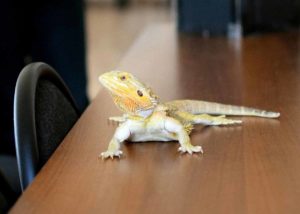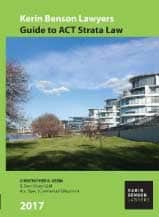An ACT lot owner would like to know if the owners corporation has the power to remove pets from a lot owner’s unit. Christopher Kerin, Kerin Benson Lawyers provides the following information.
Question: What is the owners corporation’s power around pet ownership and the removal of pets in ACT? Do they have the power to remove pets from an individual unit?
Answer: If the owner doesn’t comply with the rule in relation to pets, a rule infringement notice can be issued against them with the resultant penalty being payable.
GET NOTIFIED WHEN WE PUBLISH NEW Q&As, NEWS AND ARTICLES TO THE SITE
In terms of forcing someone to get rid of a pet, if they don’t comply with the rule in relation to pets, a rule infringement notice can be issued against the owner with the resultant penalty being payable. Rule infringement notices can be issued repeatedly in relation to a repeated breach of a rule over a period of time.
This excerpt about an owners corporation’s power around pet ownership and the removal of pets in ACT has been provided from Christopher Kerin’s book: Guide to ACT Strata Law
3.27 Pets. A unit owner may keep an animal, or allow an animal to be kept, within the unit or the common property only with the consent of the owners corporation. Unit Titles (Management) Act 2011 (ACT) s 32(1).
The owners corporation may give consent under this section with or without conditions. section 32(2) and section 32(3) states that the owners corporation’s consent must not be unreasonably withheld. This means that owners corporations in the ACT cannot have a blanket ‘no pets’ policy as it would be regarded as unreasonable and in breach of section 32(3).
 Section 32(4) defines animal as including:
Section 32(4) defines animal as including:
- an amphibian; and
- a bird; and
- a fish; and
- a mammal (other than a human being); and
- a reptile.
Section 126 of the UTMA applies to a dispute relating to keeping an animal or allowing an animal to be kept in a unit between:
- the owners corporation; and
- an owner or occupier of a unit.
Section 126(2) states that a party to the dispute may apply to ACAT for an order in relation to the other party if the application relates to the dispute. Section 126 (3) states that to avoid doubt, only a party mentioned in this section in relation to a particular dispute may apply to ACAT in relation to the dispute. The example given in the UTMA which addresses this issue is as follows:
‘Tony is in dispute with his neighbour, Fabian, about the pets Fabian keeps in his unit. The owners corporation is also in dispute with Fabian about the pets. Only the owners corporation can apply to ACAT for an order against Fabian in relation to the dispute.’
Section 126 provides a mechanism by which owners can seek a review of decisions of the owners corporation denying them permission to have a pet. This does not entitle an owner who is not a person mentioned in section 126(1)(a) to bring an application under 126. However, there is nothing in section 126 that operates to prohibit a person from relying upon some other right or entitlement in relation to the keeping of ‘pets’ in the premises – for example, this would not act as a bar on an application for review of an unsuccessful motion that a rule infringement notice be issued because a person was keeping a pet in breach of the rules. Martin vs The Owners – Units Plan No 220 & Ors (Unit Titles) [2017] ACAT 22 at 86.
Further, section 129(1)(1) of the UTMA addresses the kinds of ACAT orders which may be made in relation to animals. ACAT may make the following orders:
- if the dispute relates to a matter mentioned in section 126(1)(a) – an order to remove the animal from the unit if –
- a condition requiring the owners corporation’s consent to keeping the animal is not complied with; or
- the animal is causing a nuisance.
On the issue of animal nuisance, reference should also be had to section 14.06 (pg 377) of the Guide to ACT Strata Law and the Domestic Animals Act 2000 (ACT).
Finally, given pet requests are frequently made by prospective tenants or owners and each request must be decided upon individually, it is common for owners corporations to delegate authority in this regard to executive committees rather than constantly call general meetings (see section 7.13 pg 225 of the Guide to ACT Strata Law regarding the delegation of owners corporation powers to executive committees).
This post appears in Strata News #319.
Have a question about the owners corporation’s power to remove pets in ACT or something to add to the article? Leave a comment below.
Read next:
- NSW: Opening Apartment Garage Door During Power Outage/Emergency
- NSW: Your Bushfire Checklist for Strata Properties
- ACT: Q&A Can the EC Refuse Requests for Solar Panel Installations?
Christopher Kerin
Kerin Benson Lawyers
P: 02 8706 7060
E: [email protected]
This article is not intended to be personal advice and you should not rely on it as a substitute for any form of advice.
 After more detailed information dealing with Strata Law in the ACT? Chris Kerin’s Guide to ACT Strata Law is now available.
After more detailed information dealing with Strata Law in the ACT? Chris Kerin’s Guide to ACT Strata Law is now available.
Visit Strata Pets Living in Apartments OR Australian Capital Territory Strata Legislation
Looking for strata information concerning your state? For state-specific strata information, try here.
After a free PDF of this article? Log into your existing LookUpStrata Account to download the printable file. Not a member? Simple – join for free on our Registration page.



Leave a Reply